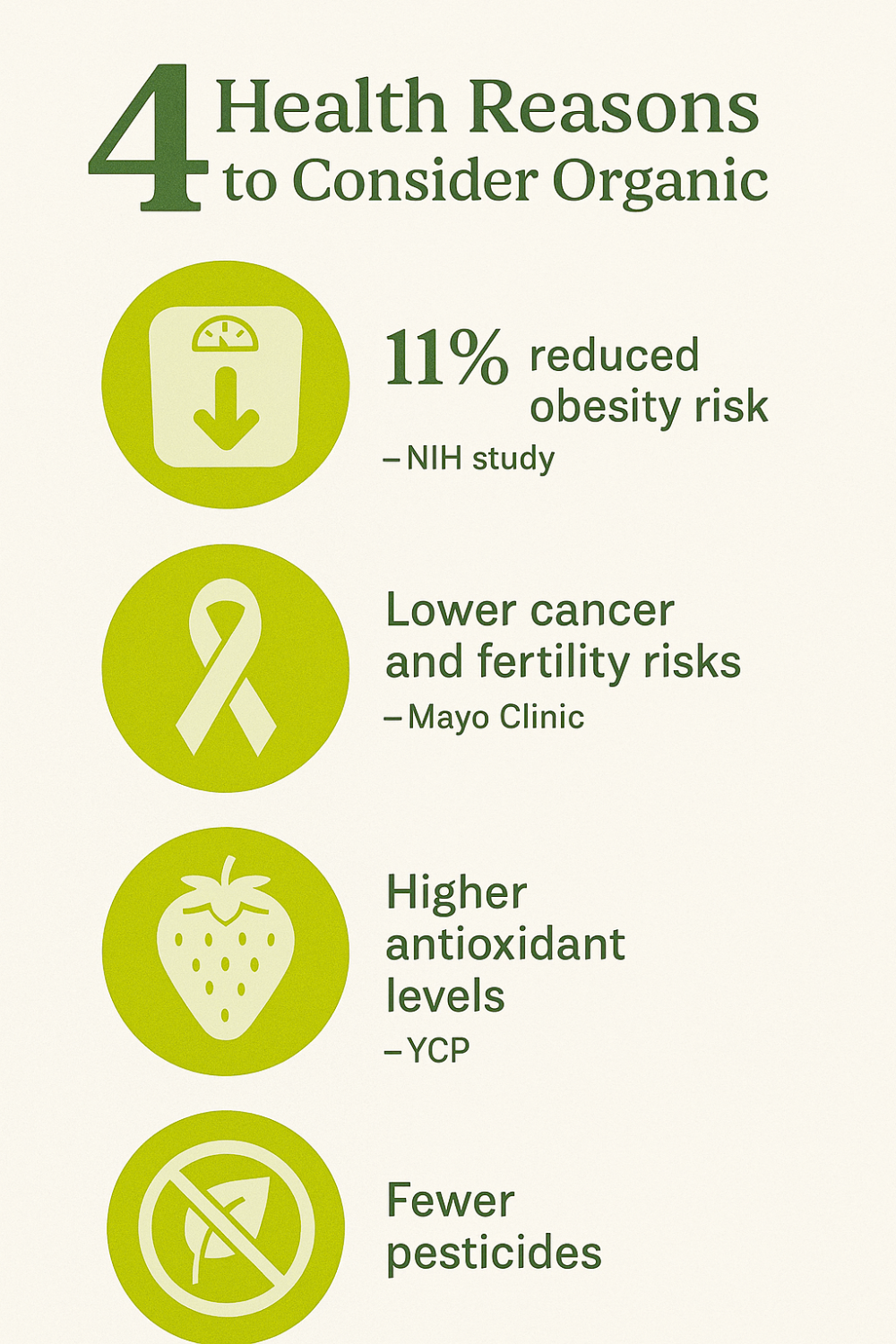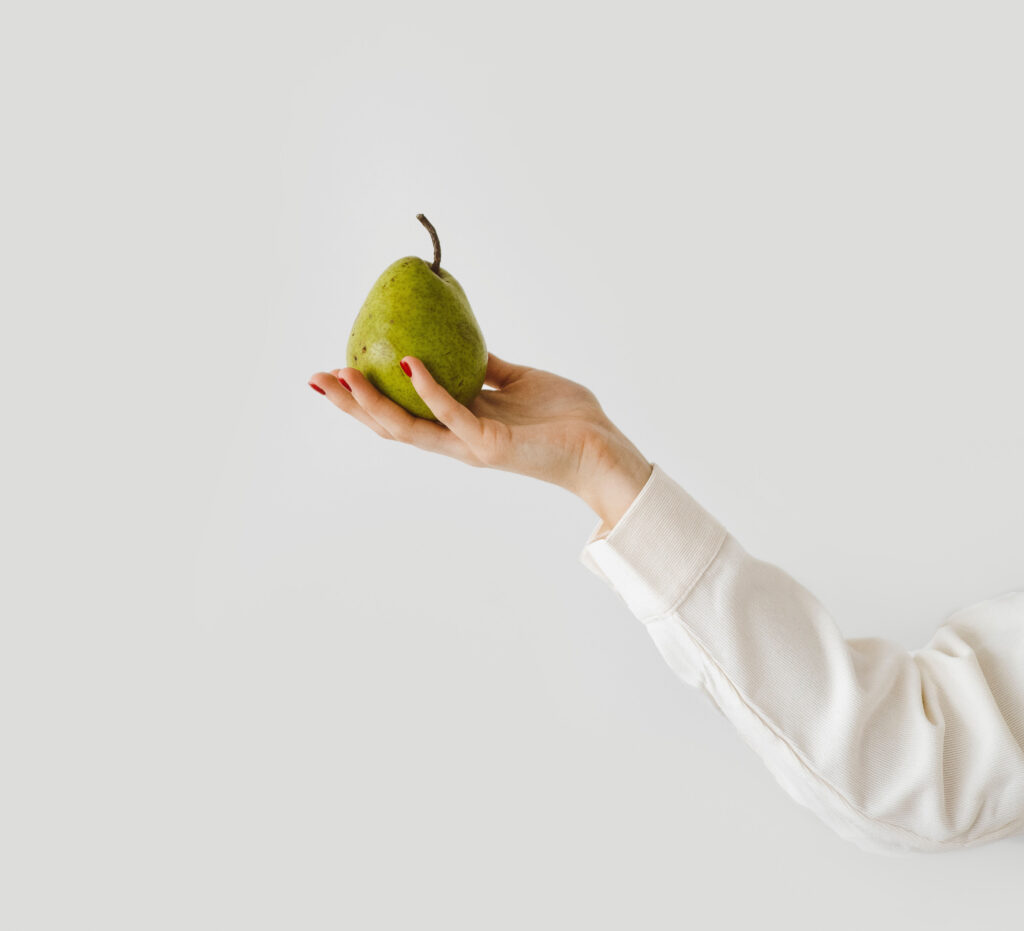
There’s been a growing curiosity in recent years around the true health benefits of organic food. For those who want to honor God through their choices—from how we treat our bodies to how we care for creation—the question matters: Is organic food truly better for our health, or is it just hype?
This blog explores the evidence around organic food and its impact on human health, written from the perspective that all of us—whether we realize it or not—were created with intention, care, and purpose. Because every person bears the image of God, our bodies are worth nurturing, and our choices matter.
Whether you’re already mindful about what you eat or just beginning to ask deeper questions, this is an invitation to explore how food, faith, and wellness intersect.

When Food Became Sacred: How Burnout Led Me to See the Grocery Store as a Place of Healing
After college, I found myself working nearly 80 hours a week—splitting my time between the National Park Service and serving as a mental health counselor. In the middle of that exhausting season, my health took center stage. Grocery shopping stopped being a routine chore and became something sacred. The store aisles began to feel like a pharmacy. I found myself asking: What foods will fuel my body for this week? What will help me find rest?
That was the beginning of my journey toward understanding the connection between what I eat and how I feel—physically, emotionally, and spiritually.

Organic Food and Obesity Risk: A Surprising Link
A 2022 study published by the NIH found that people who regularly consume organic food are 11% less likely to be obese compared to those who don’t (source). That’s a meaningful number—especially when you consider how obesity connects to a range of chronic illnesses.
But the question isn’t just “does it work?”—it’s why?
Organic eaters often:
- Eat more fruits, vegetables, and fiber
- Avoid ultra-processed snacks
- Have lower exposure to hormone-disrupting pesticides
This suggests that organic food habits might reflect a bigger shift toward intentional, healthy eating.
From Convenience to Intention: Learning to Shop Like a Modern-Day Gatherer
When I moved to Washington to work at National Park Service, my experience of going to the grocery store was elevated once again. Now, it wasn’t just about going to the pharmacy, now it was about supporting the organic farmer next door.
As I walked the isles of my local Co-op I took my time. I considered what each product was and where it came from, AND how it was produced. Gone were the days where I just threw things in my shopping cart out of mere routine, I asked questions, and I second guessed if what I was eating would be beneficial.
What I realize now is that this was intentional eating. It was a version of hunting and gathering for what my body truly needed not just wanted.
Cancer, Fertility & Pregnancy Risks: What the Research Says
Some studies, including those cited by the Mayo Clinic, have found lower rates of certain cancers and reduced fertility and pregnancy risks among people who eat organic—though findings aren’t always conclusive.
Still, here’s what we do know:
- Pesticide residues may contribute to long-term health issues
- Organic foods help reduce exposure, especially during critical times like pregnancy
- Choosing organic can be one way we honor the bodies God has entrusted to us (1 Cor. 6:19-20)
When Food Became Worship: Seeing My Body as a Temple, Not a Task
At first, my health journey was all about survival—I just needed to stay sharp and energized for work. But something shifted when I read 1 Corinthians 6:19–20: “Do you not know that your bodies are temples of the Holy Spirit…?” Suddenly, nutrition wasn’t just physical—it was spiritual. My body wasn’t just mine to manage; it was a dwelling place for God.
That truth reframed everything. Junk food made me feel sluggish and disconnected. But whole, nutrient-rich foods? They gave me energy, clarity, and a sense of alignment with how I was created.
I realized: feeding myself well isn’t legalistic—it’s worship. It’s how I steward the mind, body, and spirit God designed with care.

Join our Mailing List
Join our community of conscious eaters. Be the first to hear about product updates, new blog posts, and special offers designed to nourish body and soul.
By submitting your information, you`re giving us permission to email you. You may unsubscribe at any time.
Nutritional Value: Is Organic Really “Healthier”?
The short answer? Sometimes. But not always. According to YCP’s research summary, most studies show little difference in vitamin or mineral content between organic and conventional produce.
But here’s the bigger picture:
- Organic foods often have higher antioxidant levels
- They limit your intake of synthetic chemicals, preservatives, and GMOs
- Health isn’t just about what you get—it’s also about what you avoid
So no, eating organic won’t make you superhuman overnight. But it does support a more intentional, less contaminated lifestyle.
Food Isn’t Everything: Letting Go of Perfection and Embracing Stewardship
I’ve had to remind myself often: we live in a fallen world, and no food system is perfect. I could eat all the “right” things and still get sick, still age, still ache. Because my ultimate hope doesn’t rest in kale or carrots—it rests in Christ.
As Jesus reminds us, “It’s not what goes into the mouth that defiles a person, but what comes out of the heart” (Matthew 15:11). That doesn’t mean food doesn’t matter—it means food isn’t everything. I do my best, not to earn God’s approval, but to live in alignment with His wisdom and care for creation.
This is about stewardship, not control. I eat well because I want to feel well, think clearly, and serve fully. But I don’t idolize food—I surrender it.

Not All Organic Food Is Created Equal: Smart Shopping Tips
Just because a label says “organic” doesn’t mean it’s automatically better.
Here’s how to make wise decisions:
- Check the label: Look for USDA Organic certification
- Prioritize produce: Focus on the Dirty Dozen (high pesticide produce)
- Read ingredient lists: Some organic snacks are still processed junk
- Buy local when possible: Farmers markets often offer organic or low-spray produce without the markup
The call to steward our health wisely includes discernment. Not every organic food honors your body—or your budget.

Takeaways that fuel faith
As Christians, we believe our bodies are instruments for worship, service, and joy. Choosing foods that nourish us well—when we’re able—is one small way we honor God with our health.
That doesn’t mean you have to buy everything organic, but it’s worth asking:
- Am I treating my body with care and respect?
- Do I consume foods that support clarity, energy, and well-being?
- Am I being mindful about what I put into the vessel God gave me?
Grace Over Guilt: Why Honest Eating Matters More Than Perfect Choices
The slow walks through the grocery store, pausing to consider what I’m actually placing in the cart—that’s where this all began. And let’s be real: I don’t always get it “right.” Some days, I just want a late-night burger, a bag of chips, and my monthly pint(s) of ice cream.
Honestly? Those nights are more about pleasure than soul care… and that’s okay.
At the end of the day, the Lord calls us to walk with Him—and sometimes that walk includes honest eating. Coming to God as you are is better than carrying guilt.
He’s not interested in the curated version of you. He already knows the truth. There’s no hiding. Not in a weird, helicopter-parent kind of way—but in a holy, all-knowing, ever-loving kind of way.
The kind that sees you fully and still says, “Come.”

Final Thoughts
Organic food isn’t a magic solution—but it can be part of a healthier, more intentional lifestyle. Especially for young Christians seeking to align faith with food choices, it’s a conversation worth having.
Explore. Learn. Pray. And eat well.
Resources:




Leave a Reply